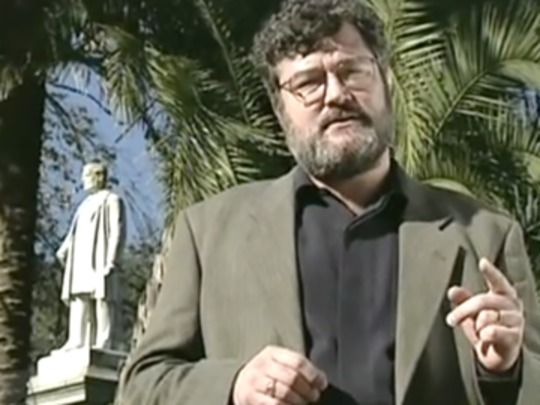
The New Zealand Wars
Television, 1998
This series has two backgrounds:
A perspective
In June 2008 the soon-to-be Prime Minister, John Key, expressed the surprising view on Newstalk ZB that, "we're not a country that's come about as a result of civil war or where there's been a lot of fighting internally, we're a country which peacefully came together".
As New Zealand's answer to Simon Schama, Jamie Belich, showed all too ably in this series, that is just not so.
As a trail blazing young history professor, Belich had already argued strongly against the politically convenient stereotype that casts New Zealand as a dull country with an uneventful history: where Pākeha turned up, shook hands and hongied with tangata whenua and bi-culturally blissed out for 150+ years of paternalistic colonial destiny, farming sheep and doing hakas before rugby matches. "Real history, we were told, happened overseas."
Belich readily picked up what he plainly saw as a worthy challenge: to alleviate New Zealand's "historical amnesia". His scholarship on the land wars of the 19th Century was begun as his D.Phil (doctoral) thesis as a Rhodes scholar, and published as The New Zealand Wars and the Victorian Interpretation of Racial Conflict. It helped reframe the wars - sometimes known as ‘the Maori Wars' (with its ‘native-quelling' connotations) - as ‘the New Zealand Wars'. The book sold an impressive 20,000 copies.
"The purpose of history is not, as too many historians imagine, to faithfully photograph chaos. We need to detect and understand processes that cause change and continuity in apparent chaos, or at least impose meaning on it. To do this we have to speak of rough patterns and categories, ideally at minimal damage to the facts."
In the television series, as in his academic work, Belich was as good as his word, making a natural transition from the precise inflections of academia to the entertaining generalities of television.
While it's true he was to be forever caricatured thereafter for his peculiar delivery: a blend of oratory and digital martial arts (as if Belich was marshalling a landing plane while in a trench describing the brilliance of Titokowharu's tactics), there is no mistaking Belich's passion, or the skill of his storytelling.
In contrast to many failed attempts to put the nation's past on the screen, The New Zealand Wars gives history a good name. It is just plain engaging.
Partly it is Belich's talent for identifying telling, salty details, whether it's Titokowharu's letter taunting colonial command with the fact that his men had ritually killed and eaten a solider: "A word to you: cease travelling on the roads: I have begun to eat human flesh and my throat is constantly open for the flesh of man", or describing the philandering Governor Grey's decision to not speak to his wife for 30 years (for flirting with a naval officer) as "a trifle harsh, even for the days of the double standard".
He also has a knack for concocting nifty neologisms, such as his description of the ideology that was driving colonial New Zealand as ‘Better Britain' (a term coined in Belich's book Paradise Reforged).
Partly this is a result of Belich's myth busting. He leaves no sacred cow untipped in raking the past for nuggets of inconvenient truth; but the effect is not to show off an iconoclast's scholarship. Instead, he draws the viewer into a complex and fascinating narrative, populated by rich and motivated characters.
As Belich says in his series summary, "We don't need to look overseas for our Robin Hood, our Genghis Khan, Joan of Arc, or Gandhi". And the stories of Hone Heke, Governor Grey, Titokowharu, Te Whiti, Von Tempsky and Te Kooti, with their Boy's Own auras, easily affirm his conviction.
Belich mentions that his interest in NZ history was spawned while digging a Māori trench working on the set of epic TV series The Governor as a student. He reflected that it looked more like a "chunk of the Western Front" than a Māori pa, and he wondered why he had never been taught about NZ history at school. "It opened my eyes to the history right in front of me".
The genesis of The New Zealand Wars television series involved a similar reflection. Producer Colin McRae's young children were watching Saturday morning cartoons and browsing channels. He chanced upon Ken Burns' acclaimed Civil War documentary series and pondered whether the scope and drama of Burns' doco could be found in our own history.
McRae shared Belich's instinct that our stories were as epic as those "from overseas". He sought out the New Zealand Wars book, and approached Belich with the proposal to adapt it for a TV series. Belich was skeptical (others had approached him and had no luck developing the concept further) but wished him luck.
With support from TVNZ commissioner Tom Finlayson, McRae secured development funding from NZ On Air and, with Tainui Stephens (then working at TVNZ) onboard as director, and Whai Ngata (then head of Māori progamming at TVNZ) as an associate producer, they shot a promo with Belich. On the strength of the promo they received the green light to film the series.
The New Zealand Wars' stylistic palette includes actor-read readings from letters and journals, archival stills and paintings, but also contemporary footage and interviews. The film-making doesn't attempt anything overtly unorthodox, but the intrinsic interest of the subject keeps shining through.
The most notable visual feature of the show was its extensive use of computer generated recreations of battlefields (by Animation Research Limited). Because this is done in a restrained manner, and well integrated with other footage of the sites, it has not dated the series terribly much, even though CGI has advanced considerably in the meantime.
At the heart of the series is Belich's performance, communicating genuine knowledge with infectious zeal, but tempered by input from other authorities, Māori and Pākehā. The makers are confident enough in Belich and and in the material (and ultimately their audience) to not resort to a Shortland Street star or epileptic editing to supplement it.
In a climate where history, particularly local history, has become a dirty word on television, it is difficult to imagine this show being commissioned today. But there is no doubt that the medium's capacity to inform and educate is already sorely missed.
The series created popular enthusiasm for New Zealand history, helped by publicity-stirring controversy (some historians raised their arm-patches and accused Belich of riding "his hobby horse of promoting the role of Māori fighting chiefs in the Land Wars"). His flailing hand gestures achieved a fame all of their own.
The New Zealand Wars showed that history, particularly our history had a heart, beating, as Belich put it, "in our streets, in our parks and in the living pulse of our land".
The series won Best Script (Factual Programme/Documentary) at the 1998 TV Guide Television Awards, and was awarded a Media Peace Award. Producer Colin McRae recalled that ratings for the series "absolutely floored" network doubters. Despite this, further series featuring Belich and NZ history were sadly, predictably, not commissioned.
